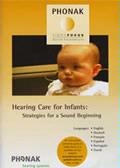News / Document Search Results
3/3/2014
Webinar: Autism Spectrum Disorder and Children Who Are Deaf or Hard of Hearing
AUCD webinar - February 2014
Funded through the Maternal and Child Health Bureau (MCHB), the LEND Pediatric Audiology Training Program supports 10 LEND programs to increase the didactic content and clinical experience of trainees in pediatric audiology. This webinar used a combination of information from the literature, retrospective chart review of children with a dual diagnosis and feedback from family and professional focus groups to assist the learner in understanding the unique needs of children who are deaf/hard of hearing with an autism spectrum disorder. Red Flags for atypical communication were presented as well as information about the needs related to communication, functional skills, and integrated care models.
3/29/2011
Hearing Screening in the Neonatal Intensive Care Unit
Presentation to the American Speech-Language-Hearing Association
Presentation provided by Jackson Rousch, Ph.D, University of North Carolina School of Medicine and Karen Munoz, EdD, National Center for Hearing Assessment and Management in November 2010
5/14/2010
Early Hearing Detection & Intervention (EHDI) Program EHDI > Links Español (Spanish) Related Links DISCLAIMER: Links to organizations outside of CDC are included for information only. CDC has no control over the information at these sites. View
This is a link related to the Early Hearing Detection & Intervention (EHDI) Program.
5/14/2010
CDC-EHDI State Profile
The state profile site is an online resource of Early Hearing Detection and Intervention (EHDI)-related information that is available on the CDC EHDI website. The profile includes answers to questions about EHDI programs, such as: screening and referral procedures, tracking and surveillance systems, educational materials, and program structure.
5/14/2010
Clinical Report - Hearing Assessment in Infants and Children: Recommendations Beyond Neonatal Screening
Congenital or acquired hearing loss in infants and children has been linked with lifelong deficits in speech and language acquisition, poor academic performance, personal-social maladjustments, and emotional difficulties. Identification of hearing loss through neonatal hearing screening, regular surveillance of developmental milestones, auditory skills, parental concerns, and middle-ear status and objective hearing screening of all infants and children at critical developmental stages can prevent or reduce many of these adverse consequences. This report promotes a proactive, consistent, and explicit process for the early identification of children with hearing loss in the medical home. An algorithm of the recommended approach has been developed to assist in the detection and documentation of, and intervention for, hearing loss.
5/14/2010
Deafness and hearing loss
This is a link related to the Early Hearing Detection & Intervention (EHDI) Program.

5/14/2010
Ear and Hearing Center Downloads
These Videos were filmed at the Department of Otolaryngology. Production services were provided by Horizon Productions, Durham, NC. Funding was provided by Phonak hearing systems. To view the videos, Apple Quick Time is required. This application is available for download at: http://www.apple.com/quicktime/download
5/14/2010
Early Hearing Detection & Intervention (EHDI) Program
Each year in the United States (U.S.), more than 12,000 babies are born with a hearing loss. The cause of hearing loss for many babies is not known, and hearing loss can go unnoticed for years. When a child?s hearing loss is identified soon after birth, the child?s family and doctors can make sure the child gets services (e.g., intervention) he or she needs at an early age. This will help the child develop communication and language skills that will last a lifetime.
5/14/2010
Newborn Hearing Screenings
Why Screen Newborns? Newborn hearing screenings are extremely important. When newborns have hearing loss and are diagnosed early, effective intervention is available to help them achieve normal or nearly normal speech, language, and hearing milestones
5/14/2010
Newborn Screening Expands: Recommendations for Pediatricians and Medical Homes - Implications for the System
Advances in newborn screening technology, coupled with recent advances in the diagnosis and treatment of rare but serious congenital conditions that affect newborn infants, provide increased opportunities for positively affecting the lives of children and their families. These advantages also pose new challenges to primary care pediatricians, both educationally and in response to the management of affected infants. Primary care pediatricians require immediate access to clinical and diagnostic information and guidance and have a proactive role to play in supporting the performance of the newborn screening system. Primary care pediatricians must develop office policies and procedures to ensure that newborn screening is conducted and that results are transmitted to them in a timely fashion; they must also develop strategies to use should these systems fail. In addition, collaboration with local, state, and national partners is essential for promoting actions and policies that will optimize the function of the newborn screening systems and ensure that families receive the full benefit of them.
5/14/2010
Programa de detección auditiva e intervención tempranas (DAIT)
Promoción de la comunicación desde el nacimiento
Anualmente 1 ó 2 niños de cada 1,000 nacen con pérdida auditiva. Cuando la pérdida auditiva en un niño es identificada inmediatamente después de su nacimiento, su familia y los profesionales pueden asegurar que el niño se beneficie de servicios de intervención temprana a corta edad. Ello ayudará al niño a desarrollar destrezas de comunicación y lenguaje que perdurarán toda la vida. Los programas DAIT estatales reciben apoyo tanto de entidades estatales y federales como de grupos privados. Estos programas promueven la prueba de pérdida auditiva, oportunos exámenes de seguimiento y servicios de intervención temprana para todos los bebés. Los elementos claves de los programas DAIT son la prueba de audición, la evaluación audiológica (auditiva) y médica y las intervenciones tempranas.
5/14/2010
State and Territory Early Hearing Detection and Intervention (EHDI) Program Contact List
(Updated March 11, 2010)
5/14/2010
The Early Hearing Detection and Intervention (EHDI) Program
Promoting Communication from Birth
Every year 1 to 3 in every 1,000 children are born with hearing loss. When a child?s hearing loss is identified soon after birth, families and professionals can make sure the child gets intervention services at an early age. This will help the child to have communication and language skills that will last a lifetime. EHDI programs at the state level get support from federal and state agencies and private groups. These programs promote that all infants be screened for hearing loss and get timely follow-up testing and early intervention services. The key parts of EHDI programs are hearing screening, audiologic (hearing) and medical evaluation, and early intervention.
5/14/2010
Universal Screening for Hearing Loss in Newborns
Children with hearing loss have increased difficulties with verbal and nonverbal communication skills, increased behavioral problems, decreased psychosocial well-being, and lower educational attainment compared with children with normal hearing. Because half of the children with hearing loss have no identifiable risk factors, universal screening (instead of targeted screening) has been proposed to detect children with permanent congenital hearing loss (PCHL). There is good evidence that newborn hearing screening testing is highly accurate and leads to earlier identification and treatment of infants with hearing loss.







